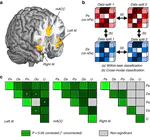Embodying Pain
Embodied models of social cognition argue that representations of first-hand sensorimotor experiences (such as physical pain) are re-enacted during the interaction with other people, for instance when we empathize with others’ suffering or we witness unfair/ostracizing treatments. The goal of this project is to ascertain whether first-hand experiences influence social behavior through sensory-specific processes or supramodal representations of dimensions such as unpleasantness, which are common to many qualitatively different states.
pain
empathy
emotion
Unpleasantness
arousal
moral cognition
Unfairness
Self-Other distinction
Social cognition
Social interactions
Social Exclusion
Cyberball
disgust
Facial Expressions
face processing
Representation Similarity
Insula
Cingulate Cortex
Publications
Medical students and professional healthcare providers often underestimate patients’ pain, together with decreased neural responses to …
Corrado Corradi˗Dell'Acqua, Christoph Hofstetter, Gil Sharvit, Olivier Hugli, Patrik Vuilleumier
Evaluating correctly others’ pain is a crucial prosocial ability, especially relevant for the healthcare system. In clinical …
Laura Riontino, Raphael Fournier, Alexandra Lapteva, Nicolas Silvestrini, Sophie Schwartz, Corrado Corradi˗Dell'Acqua
Embodied models of social cognition argue that others’ emotional states are processed by re-enacting a representation of the same …
Giada Dirupo, Corrado Corradi˗Dell'Acqua, Maha Kashef, Martin Debbané, Deborah Badoux
Embodied models suggest that moral judgments are strongly intertwined with first-hand somatic experiences, with some pointing to …
Gil Sharvit, Enru Lin, Patrik Vuilleumier, Corrado Corradi˗Dell'Acqua
Embodied models of social cognition argue that others’ affective states are processed by re-enacting a sensory-specific representation …
Lia Antico, Eugénie Cataldo, Corrado Corradi˗Dell'Acqua
Seminal theories posit that social and physical suffering underlie partly-common representational code. It is unclear, however, if this …
Lia Antico, Amelie Guyon, Zainab K. Mohamed, Corrado Corradi˗Dell'Acqua
Patients with borderline personality disorder (BPD) often engage in dangerous self-injurious behaviors (SIBs) as a maladaptive …
Emilie Olié, Kimberly C. Doell, Corrado Corradi˗Dell'Acqua, Philippe Courtet, Nader Perroud, Sophie Scwartz
People’s sensitivity to first-hand pain is affected by their ongoing emotions, with positive states (joy, amusement) exerting …
Emilie Qiao-Tasserit, Corrado Corradi˗Dell'Acqua, Patrik Vuilleumier
In the last decade, a growing research effort in behavioral sciences, especially psychology and neuroscience, has been invested in the …
Corrado Corradi˗Dell'Acqua, Leonie Koban, Susanne Leiberg, Patrik Vuilleumier
The anterior insula (AI) and mid-anterior cingulate cortex (mACC) have repeatedly been implicated in first-hand and vicarious …
Corrado Corradi˗Dell'Acqua, Anita Tusche, Patrik Vuilleumier, Tania Singer
The discovery of regions in the human brain (e.g., insula and cingulate cortex) that activate both under direct exposure to pain and …
Corrado Corradi˗Dell'Acqua, Christoph Hofstetter, Patrik Vuilleumier



